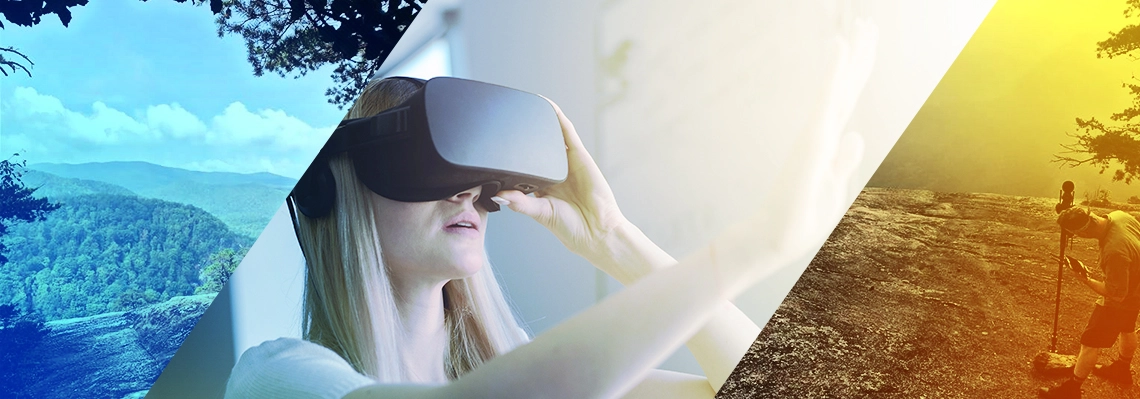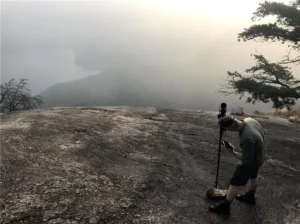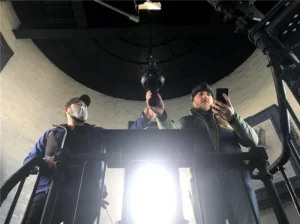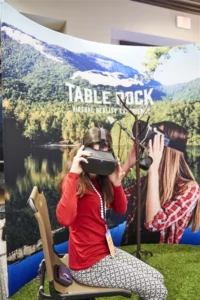
Virtual Reality Heads Off in A Different Direction
A lot of people associate virtual reality with the latest in gaming, and for good reason. With its ability to seamlessly immerse players in a gamescape across sight, sound and motion, the 360-degree world of VR is a no-brainer for serious gamers. Of course, there’s no such thing as VR without a good headset, and while headsets like the Oculus Rift and the newer Quest are reasonably priced, their use is still not mainstream. VR’s deeply immersive nature is what makes it appealing, but it’s also the very thing that makes it a more committed form of technology, and therefore less widely appealing than say, simply using the phone that’s already in your hand. It will probably never be something you indulge in for 45 seconds while you wait for everyone to join the Zoom call, like we do now with our phones and social media.
As the technology evolves, however, and the price of good headsets decreases to a point where more people are more willing to experiment, it seems likely that its use will increase. This is exciting because there’s a wide range of potential uses for VR that most people would find beneficial, from basic things like educational demos to straight-up fun, like live comedy shows and music concerts. The point being, VR is an awesome way to widen participation in the everyday activities that people are already doing. It doesn’t have to be technology to create a techy, artificial world, like a lot of people tend to associate with VR. Chris Milk, the founder of Within & Here Be Dragon Studio, nicely sums up the potential of this more human side to the technology.
“Virtual Reality is the ‘ultimate empathy machine.’ These experiences are more than documentaries. They’re opportunities to walk a mile in someone else’s shoes.”
One example of this less-expected type of VR is an ongoing project that 9Rooftops is creating for our client, South Carolina Department of Parks, Recreation and Tourism (SCPRT). It started with a simple notion. We wanted to find a way to bring a signature state park experience, like hiking in the beautiful mountains of South Carolina, to those who weren’t physically able to hike rugged terrain or who simply didn’t have the time. The project would serve two basic purposes: to help those who couldn’t hike the trail experience the full beauty of nature while also inspiring more abled adventurers who were simply curious about what South Carolina has to offer. VR was a natural fit. It’s also just a cool way to be transported to an entirely different place—in other words, perfect for tourism marketing.
After a lot of collaboration, we decided to create the Table Rock Virtual Reality Experience, a 360-degree video of the complete hike to the top of gorgeous Table Rock Mountain. The hike was to be viewed with a VR headset, offering interstitial infographics along with the soothing sounds of waterfalls, birds and wind. Although it would’ve been true
to the experience, we did not include the grunts and panting of our tireless videographer, Jeff Mayoh, as he made his way along the strenuous, 7-mile, 2,300-foot climb with a cumbersome, 6-lens, 8K camera rig strapped to him. Yes, Jeff earned his beer that day.


While shooting videos and tricky production is nothing new for 9Rooftops Studio, the 360-degree shoot came with its own unique set of challenges. The camera was mounted on a gimballed stabilizer atop a 4-foot monopod that was placed inside a backpack with counterweights. This raised the camera high enough above Jeff to offer a good view in all directions, while minimizing the view of the shooter. Fully rigged up, Jeff looked like a rugged, human version of the Google Prius you occasionally see droning down the road with its conspicuous, spherical camera. The fact that we were shooting in all directions at once also meant that everything and everyone had to be clear for shooting, all the time. Like Wile E. Coyote attempting to ambush the Road Runner, the crewmembers became adept at ducking behind trees to clear frame at a moment’s notice. Weather, ambient lighting and sun direction also had to be factored in, since the hike needed to be visually seamless and authentic in every way.
Post-production was equally intensive. We had 360-video of the hike and we had VR headsets, but you can’t simply put the two together and get the experience we wanted. That required a custom Unity Real-Time Development platform, along with a custom-designed UI. The final branded experience allowed users to have control over where they went and what they saw, while learning a little about the sights as the hike progressed. Of course, we could try to describe the VR experience to you, but, like the real hike, that would be ridiculously inadequate. Some things you just have to do to fully understand.
To support the experience, 9Rooftops developed a custom-designed booth, which went on tour to trade shows, park activations and press events. The invitation was simple, Bring your imagination. Leave your hiking boots. The booth included thoughtful touches like, artificial grass, stumps and camping chairs for users to sit on, along with tree branches on which to hang the headsets.

Altogether, it was a hit. In fact, the Table Rock VR Experience was so successful that SCPRT decided to do it again for two other old-school yet awesome South Carolina experiences—walking to the top of the historic lighthouse at Hunting Island State Park and paddling down the Catawba river during the annual spider lily bloom at Landsford Canal State Park. The Hunting Island experience is now complete, while the Catawba River paddle is currently in post-production.
We’re already thinking of innovative new experiences for SCPRT, including more state park adventures, as well as historical tours and sports. It seems the real world has plenty to offer when it comes to VR, no games required.
This is not an advertisement, and solely reflects the views and opinions of the author. This website and its commentaries are not designed to provide legal or other advice and you should not take, or refrain from taking, action based on its content.
